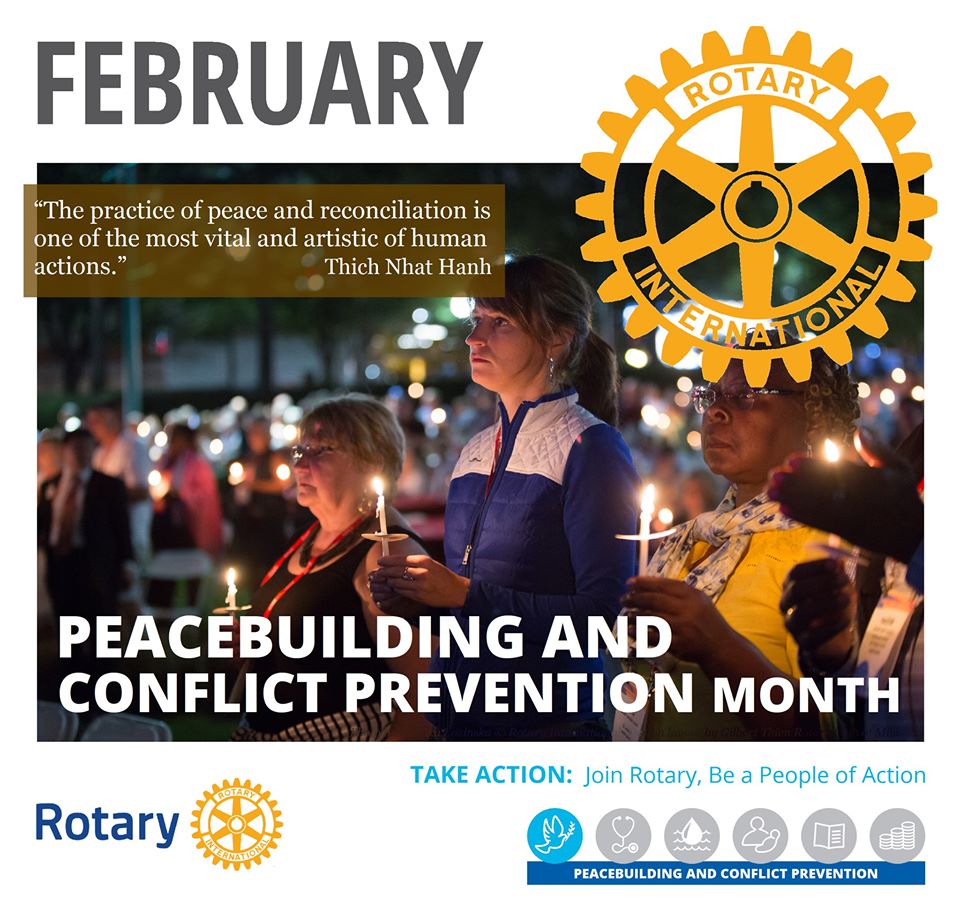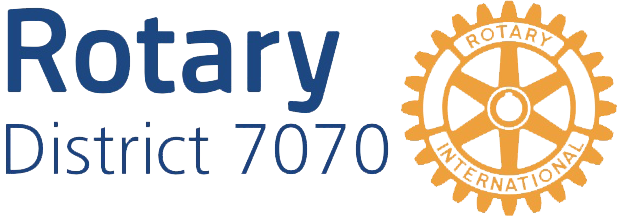

Rotarians train adults and young leaders to prevent and mediate conflict, and aid refugees who have fled dangerous areas. During February, Rotary Peace Building and Conflict Prevention Month, we’re celebrating our commitment to build peace and mitigate conflict.
February 23, Rotary's 116th Birthday is also World Understand and Peace Day
Throughout the month of February, encourage fellow Rotary members to check the rotary.org website for tips, resources, and inspirational success stories to help plan club and district peace and conflict resolution projects.
Add your voice to the conversation by using the blog’s commenting feature and share how your club peace and conflict resolution initiatives on Rotary Showcase.
PEACEBUILDING AND CONFLICT PREVENTION
Rotary supports training, education, and practices related to peacebuilding and conflict prevention through initiatives that help transform1 conflict in our communities and around the world.
Area of Focus Statement of Purpose and Goals
The Rotary Foundation (TRF) enables Rotarians to advance peacebuilding and prevent conflict by:
1. Enhancing the capacity of individuals and communities to transform conflict and build peace
2. Training community members in peace education, peace leadership, and conflict prevention and resolution
3. Providing services that help integrate vulnerable populations into society
4. Improving dialogue and community relations to determine how best to manage natural resources
5. Funding graduate scholarships for career-minded professionals related to peacebuilding and conflict prevention
Parameters for Eligibility
TRF considers the following activities to be within the scope of the peacebuilding and conflict prevention area of focus:
1. Group activities including workshops, trainings, and other programs that support peace leadership and education, Positive Peace,
2 community integration of vulnerable populations, facilitated dialogue, communication, and conflict prevention and transformation ,Education for youth on constructive ways to prevent, manage, and transform conflict, including after-school or community-based programming with robust peacebuilding and conflict-diversion activities
3. Training programs or campaigns to address conflict, or the risk of conflict, related to the use and management of natural resources
4. Legal, psychological, social, and rehabilitative services that help integrate vulnerable populations into society, including at-risk youth, refugees, trafficked people, and others affected by conflict or violence
TRF considers the following activities to be outside the scope of the peacebuilding and conflict prevention area of focus and not eligible for global grant funding:
1. Peace conferences in which Rotarians are the primary participants
2. Programs with a sole focus on music, sports, or extracurricular activities. Programs must have robust peacebuilding and conflict-diversion aspects to receive global grant funding.
3. Enrollment at a Rotary Peace Center partner university in the same, or similar, academic program as those pursued by Rotary Peace Fellows
Elements of Successful Humanitarian Projects and Vocational Training Teams
Peacebuilding and conflict prevention global grants are:
1. Sustainable — Communities can continue to make progress in peacebuilding and conflict prevention after the Rotary clubs or districts complete their work.
2. Measurable — Sponsors need to set targets and identify measurements to track project outcomes. Standard measures for peacebuilding and conflict prevention are listed in the Global Grant Monitoring and Evaluation Plan Supplement.
3. Community driven — Projects meet the needs identified by the host community.
Elements of Successful Scholarships
Global grants support graduate-level scholarships for professionals interested in pursuing careers in peacebuilding and conflict prevention. TRF considers the following when evaluating global grant scholarship applications:
1. The applicant’s previous professional experience in peacebuilding and conflict prevention, including work or research with nongovernmental organizations, governmental agencies, or international associations
2. The academic program’s alignment with peacebuilding and conflict prevention
a. Preferred academic programs include conflict prevention and resolution, peace and justice studies, social entrepreneurship related to peace, security studies, international relations, and other degrees with a specialization in peace and conflict, such as human rights law.
b. Programs that focus directly on peace and conflict issues and outcomes will be considered favorably.
c. Programs that will not be considered favorably include those related to general international relations with no emphasis on peacebuilding, conflict transformation, or conflict prevention and resolution, as well as other general social development degrees.
3. The applicant’s career plans as they relate to peace and conflict transformation, prevention, and resolution
